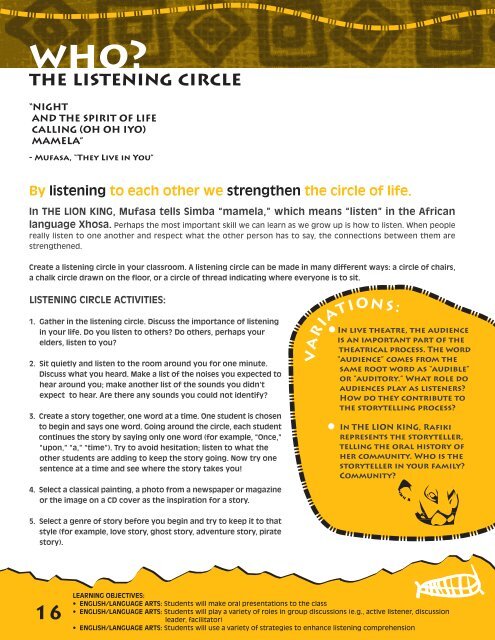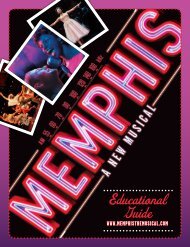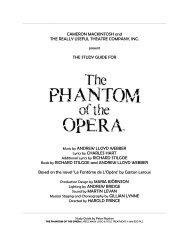The Lion King Study Guide - Telecharge
The Lion King Study Guide - Telecharge
The Lion King Study Guide - Telecharge
Create successful ePaper yourself
Turn your PDF publications into a flip-book with our unique Google optimized e-Paper software.
who?<br />
the listening circle<br />
“NIGHT<br />
AND THE SPIRIT OF LIFE<br />
CALLING (OH OH IYO)<br />
MAMELA”<br />
- Mufasa, “<strong>The</strong>y Live in You”<br />
By listening to each other we strengthen the circle of life.<br />
In THE LION KING, Mufasa tells Simba “mamela,” which means “listen” in the African<br />
language Xhosa. Perhaps the most important skill we can learn as we grow up is how to listen. When people<br />
really listen to one another and respect what the other person has to say, the connections between them are<br />
strengthened.<br />
Create a listening circle in your classroom. A listening circle can be made in many different ways: a circle of chairs,<br />
a chalk circle drawn on the floor, or a circle of thread indicating where everyone is to sit.<br />
LISTENING CIRCLE ACTIVITIES:<br />
1. Gather in the listening circle. Discuss the importance of listening<br />
in your life. Do you listen to others? Do others, perhaps your<br />
elders, listen to you?<br />
2. Sit quietly and listen to the room around you for one minute.<br />
Discuss what you heard. Make a list of the noises you expected to<br />
hear around you; make another list of the sounds you didn’t<br />
expect to hear. Are there any sounds you could not identify?<br />
3. Create a story together, one word at a time. One student is chosen<br />
to begin and says one word. Going around the circle, each student<br />
continues the story by saying only one word (for example, “Once,”<br />
“upon,” “a,” “time”). Try to avoid hesitation; listen to what the<br />
other students are adding to keep the story going. Now try one<br />
sentence at a time and see where the story takes you!<br />
4. Select a classical painting, a photo from a newspaper or magazine<br />
or the image on a CD cover as the inspiration for a story.<br />
5. Select a genre of story before you begin and try to keep it to that<br />
style (for example, love story, ghost story, adventure story, pirate<br />
story).<br />
16<br />
· In live theatre, the audience<br />
is an important part of the<br />
theatrical process. <strong>The</strong> word<br />
VARIATION S :<br />
“audience” comes from the<br />
same root word as “audible”<br />
or “auditory.” What role do<br />
audiences play as listeners?<br />
How do they contribute to<br />
the storytelling process?<br />
· In THE LION KING, Rafiki<br />
represents the storyteller,<br />
telling the oral history of<br />
her community. Who is the<br />
storyteller in your family?<br />
Community?<br />
LEARNING OBJECTIVES:<br />
• ENGLISH/LANGUAGE ARTS: Students will make oral presentations to the class<br />
• ENGLISH/LANGUAGE ARTS: Students will play a variety of roles in group discussions (e.g., active listener, discussion<br />
leader, facilitator)<br />
• ENGLISH/LANGUAGE ARTS: Students will use a variety of strategies to enhance listening comprehension





